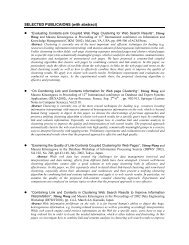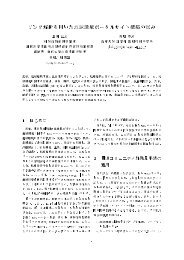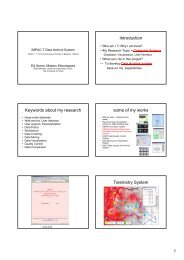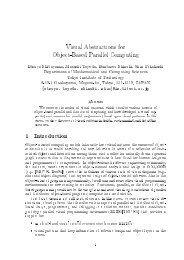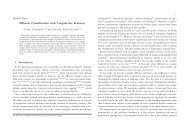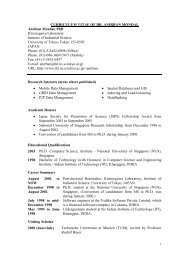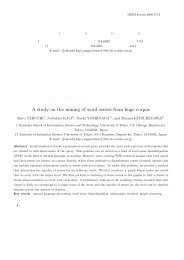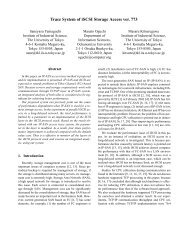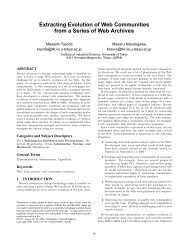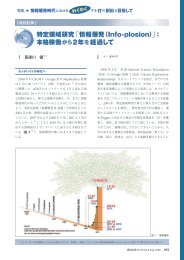Special Issue on Information Explosion
Special Issue on Information Explosion
Special Issue on Information Explosion
Create successful ePaper yourself
Turn your PDF publications into a flip-book with our unique Google optimized e-Paper software.
<str<strong>on</strong>g>Special</str<strong>on</strong>g> <str<strong>on</strong>g>Issue</str<strong>on</strong>g> <strong>on</strong> Informati<strong>on</strong> Explosi<strong>on</strong> 213<br />
recording all the functi<strong>on</strong> call traces and identifies anomalous behaviors. The key<br />
challenge here is the development of a scalable, automated technique of detecting<br />
anomalies that can effectively localize faults in large-scale envir<strong>on</strong>ments. Their<br />
c<strong>on</strong>tributi<strong>on</strong> is twofold. The pre-failure model derivati<strong>on</strong> permits to build an<br />
executi<strong>on</strong> model that reflects the functi<strong>on</strong>-calling behaviors of the target system,<br />
based <strong>on</strong> functi<strong>on</strong>-call traces collected from all processes. The post-failure modelbased<br />
anomaly detecti<strong>on</strong> allows for identifying the most deviant behaviors in the<br />
failed run by comparing the failure traces with the derived model.<br />
The third paper 11) addresses a high performance shared file system for<br />
a large-scale PC cluster system to share data and support distributed dataintensive<br />
computing. Key issues include maximizing the distributed file I/O<br />
bandwidth, avoiding access c<strong>on</strong>centrati<strong>on</strong>, and supporting fault tolerance. The<br />
c<strong>on</strong>tributi<strong>on</strong> of this paper is a global distributed file system called Gfarm Grid<br />
that federates local file systems <strong>on</strong> compute nodes and allows multiple file replicas<br />
in any locati<strong>on</strong>. Gfarm Grid features data-locati<strong>on</strong>-aware process scheduling that<br />
allows the user to manage file partiti<strong>on</strong>ing and file replica placement for better<br />
file I/O performance.<br />
The fourth paper 12) addresses image annotati<strong>on</strong> and retrieval. The problem<br />
is challenging because of various appearances of objects and a wide variety<br />
of categories. The key idea introduced in this paper is to combine the higherorder<br />
local auto-correlati<strong>on</strong> features and a framework of probabilistic can<strong>on</strong>ical<br />
correlati<strong>on</strong> analysis. The highly compressed nature of the intrinsic space arising<br />
from c<strong>on</strong>ceptual learning between images and labels allows for faster and more<br />
accurate image annotati<strong>on</strong> and retrieval results.<br />
The last paper 13) aims at building a speech processing technology that is<br />
robust against the intrinsic variati<strong>on</strong>s, differences of speaker, microph<strong>on</strong>e, envir<strong>on</strong>ment,<br />
etc. They derive speech structures as completely transform-invariant<br />
features and discuss their linguistic and psychological validity. The idea is applied<br />
to automatic speech recogniti<strong>on</strong> and computer-aided language learning.<br />
C<strong>on</strong>cluding Remarks<br />
Wikipedia defines informati<strong>on</strong> explosi<strong>on</strong> as follow: “The informati<strong>on</strong> explosi<strong>on</strong><br />
is the rapid increase in the amount of published informati<strong>on</strong> and the<br />
effects of this abundance of data. As the amount of available data grows, the<br />
problem of managing the informati<strong>on</strong> becomes more difficult, which can lead to<br />
informati<strong>on</strong> overload.” Wikipedia and others address its negative aspect such as<br />
management difficulty of informati<strong>on</strong> and informati<strong>on</strong> overload. On the other<br />
hand, we can c<strong>on</strong>sider this phenomen<strong>on</strong> a yet another opportunity for this century.<br />
Thirty years ago, there were no web, no emails. Students were waiting<br />
for new issue of academic journals. Airfare was so expensive and a quite small<br />
number of professors could attend internati<strong>on</strong>al c<strong>on</strong>ferences whose number was<br />
also very few. In those days, people starved for informati<strong>on</strong>. Now informati<strong>on</strong><br />
is explosively increasing and its overload becomes a serious problem. In other<br />
words, this is the first experience for human beings to face such overwhelming<br />
informati<strong>on</strong>.



